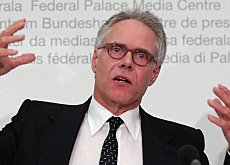
Cabinet rebukes justice minister

The cabinet says it regrets comments made by Justice Minister Christoph Blocher in Turkey earlier this month that he wanted to change the Swiss anti-racism law.
Swiss President Moritz Leuenberger said this gave the impression that Switzerland could be pressured into changing its laws depending on the circumstances.
“The cabinet remains opposed to a pure and simple abolition of the anti-racism law,” Leuenberger said on Wednesday. “This text will remain in force and will continue to be used.”
He said it was legitimate to propose making modifications, but said the cabinet regretted that the discussion had been started during a visit abroad.
Blocher, a leading light of the rightwing Swiss People’s Party, had remarked during his Turkish trip that part of the anti-racism law – which was adopted in 1994 and includes sections aimed at preventing revisionist views about the Holocaust – gave him a “headache”.
The law has led to investigations in Switzerland against two Turks, including one historian, for allegedly denying the 1915 Armenian massacre.
Armenians say around 1.8 million of their people died as a result of a forced mass evacuation by the Turkish government during the Ottoman Empire. Turkey puts the figure closer to 200,000. Under Swiss law any act of denying, belittling or justifying genocide is a violation of the country’s anti-racism legislation.
However, Blocher said at the time that it was ultimately up to the government, parliament and possibly the population, to decide on any changes.
Under scrutiny
According to Leuenberger, Blocher has told his cabinet colleagues that a working group at his ministry was already re-examining the law, in particular article 261bis, the cause of Blocher’s headache.
The justice minister was ready to include a member of the Federal Commission against Racism in this work, Leuenberger added, refusing to any further questions on the matter – which caused a media and political outcry in Switzerland – saying the content of cabinet meetings was confidential.
For his part, Blocher, speaking at a different media conference earlier in the day, said he was simply waiting for the feedback from his working group by the end of the year.
“It’s about making the anti-racism law clearer, more secure and unambiguous,” he said.
swissinfo with agencies

More
Federal Commission against Racism
Swiss anti-racism legislation was adopted in 1994, among other things to prevent revisionist views about the Holocaust.
In 2005, Swiss authorities launched criminal investigations against the historian Yusuf Halacoglu, the president of the Turkish History Organisation, and the politician Dogu Perinçek for allegedly making comments in Switzerland denying the 1915 Armenian massacre.
Armenians say around 1.8 million of their people were killed. Turkey disputes this, putting the figure closer to 200,000.
Under Swiss law any act of denying, belittling or justifying genocide is a violation of the country’s anti-racism legislation.

In compliance with the JTI standards
More: SWI swissinfo.ch certified by the Journalism Trust Initiative



























You can find an overview of ongoing debates with our journalists here . Please join us!
If you want to start a conversation about a topic raised in this article or want to report factual errors, email us at english@swissinfo.ch.